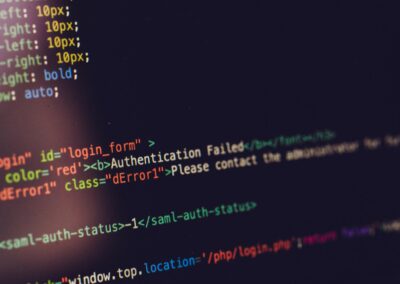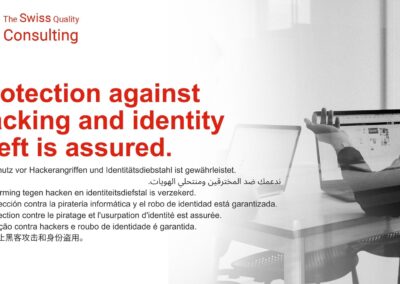The Role of Blockchain in Securing Digital Identities
Blockchain Technology for Digital Identity Protection
Blockchain technology for digital identity protection offers a transformative approach to securing personal information across various sectors, including finance and healthcare. In regions like Saudi Arabia and the UAE, where technological advancements are rapidly being adopted, the implementation of blockchain can significantly enhance data security and trust. Blockchain’s decentralized and immutable nature ensures that digital identities are securely stored and managed, providing robust protection against unauthorized access and fraud.
One of the primary benefits of using blockchain for digital identity protection is its ability to create a tamper-proof record of identity transactions. Each transaction is recorded on a distributed ledger, which is maintained by multiple nodes across the network. This decentralized approach eliminates the risk of a single point of failure, making it extremely difficult for attackers to alter or corrupt identity data. For business executives and mid-level managers in Riyadh and Dubai, adopting blockchain technology can provide a secure and transparent method for managing digital identities.
Additionally, blockchain can facilitate self-sovereign identity (SSI) systems, where individuals have full control over their personal information. SSI allows users to manage and share their digital identities securely without relying on centralized authorities. This approach not only enhances privacy but also empowers individuals to decide how their data is used and who can access it. In the finance and healthcare sectors, where sensitive information is frequently exchanged, SSI systems based on blockchain can significantly reduce the risk of data breaches and identity theft.
Implementing Blockchain in the Finance Sector
In the finance sector, protecting digital identities is crucial for preventing fraud and ensuring secure transactions. Blockchain technology can enhance the security of financial services by providing a transparent and immutable record of all transactions. This ensures that any attempt to alter transaction data can be quickly detected and addressed. For financial institutions in Saudi Arabia and the UAE, integrating blockchain into their identity management systems can offer enhanced security and compliance with regulatory standards.
Blockchain-based identity verification systems can streamline the onboarding process for new customers. Traditional identity verification methods often involve manual checks and multiple intermediaries, leading to delays and increased costs. Blockchain can automate and secure this process by providing a single, verifiable source of truth for identity data. By leveraging blockchain, financial institutions can reduce the time and cost associated with customer onboarding while enhancing security and compliance.
Furthermore, blockchain can facilitate secure and transparent cross-border transactions. In the global financial ecosystem, cross-border payments are often subject to delays and high fees due to the involvement of multiple intermediaries. Blockchain can streamline this process by enabling direct, peer-to-peer transactions, reducing the need for intermediaries and lowering transaction costs. For businesses in Riyadh and Dubai, adopting blockchain for cross-border transactions can enhance efficiency and security, driving business success and growth.
Enhancing Healthcare Security with Blockchain
In the healthcare sector, protecting digital identities is essential for maintaining patient confidentiality and ensuring the integrity of medical records. Blockchain technology can address these challenges by providing a secure and transparent method for managing patient data. Each patient’s medical records can be stored on a blockchain, ensuring that the data is tamper-proof and accessible only to authorized healthcare providers. For healthcare organizations in Saudi Arabia and the UAE, adopting blockchain can enhance patient trust and improve the overall quality of care.
Blockchain can also facilitate secure data sharing among healthcare providers. In traditional healthcare systems, sharing patient data across different institutions can be cumbersome and prone to errors. Blockchain enables seamless and secure data sharing by providing a single, verifiable source of truth for patient information. This ensures that healthcare providers have access to accurate and up-to-date patient data, improving the quality of care and reducing the risk of medical errors.
Moreover, blockchain can enhance the security of pharmaceutical supply chains. Counterfeit drugs are a significant concern in the global healthcare industry, posing risks to patient safety and undermining trust in the healthcare system. Blockchain can provide a transparent and immutable record of the entire supply chain, ensuring the authenticity of pharmaceutical products. For businesses in Riyadh and Dubai, adopting blockchain for supply chain management can enhance trust and compliance, contributing to the overall success of the healthcare sector.
Best Practices for Implementing Blockchain for Digital Identity Protection
Developing Comprehensive Blockchain Strategies
Developing comprehensive blockchain strategies is crucial for organizations seeking to enhance digital identity protection. This involves understanding the specific needs and challenges of the industry and designing tailored blockchain solutions that address these requirements. For business leaders in Saudi Arabia and the UAE, creating a clear roadmap for blockchain implementation can ensure a smooth transition and maximize the benefits of the technology.
A key aspect of developing a blockchain strategy is identifying the most suitable blockchain platform for the organization’s needs. Different blockchain platforms offer varying levels of security, scalability, and functionality. For example, public blockchains like Ethereum provide high transparency and security, while private blockchains like Hyperledger offer more control and privacy. By carefully evaluating the options, organizations can choose the platform that best meets their requirements.
Additionally, organizations should consider the regulatory landscape when developing their blockchain strategies. Compliance with data protection regulations, such as the General Data Protection Regulation (GDPR) and local data protection laws, is essential for ensuring the legality and success of blockchain implementations. Engaging with regulatory authorities and seeking legal advice can help organizations navigate the complex regulatory environment and ensure compliance.
Promoting Blockchain Education and Training
Promoting blockchain education and training within the organization is essential for ensuring successful implementation and adoption. For businesses in Riyadh and Dubai, providing employees with the knowledge and skills needed to work with blockchain technology can enhance the overall effectiveness of blockchain initiatives. Training programs should cover the fundamentals of blockchain, its applications, and best practices for implementation.
Interactive training methods, such as workshops and hands-on labs, can be particularly effective in helping employees understand and apply blockchain concepts. These training sessions can provide practical experience with blockchain platforms and tools, enabling employees to develop the skills needed to manage and operate blockchain-based systems. For business leaders, investing in blockchain education can foster a culture of innovation and position the organization as a leader in blockchain technology.
In addition to internal training programs, organizations can collaborate with educational institutions and industry associations to promote blockchain education. Partnering with universities and research institutions can provide access to cutting-edge research and emerging trends in blockchain technology. By staying informed and continuously enhancing their blockchain knowledge, organizations can ensure the long-term success of their blockchain initiatives.
Engaging with Industry Stakeholders
Engaging with industry stakeholders is crucial for driving the adoption and success of blockchain technology for digital identity protection. For organizations in Saudi Arabia and the UAE, collaborating with industry partners, regulatory authorities, and technology providers can provide valuable insights and support for blockchain initiatives. Building strong relationships with stakeholders can enhance trust and facilitate the successful implementation of blockchain solutions.
One effective way to engage with stakeholders is by participating in industry forums, conferences, and working groups. These platforms provide opportunities to share knowledge, discuss challenges, and explore best practices for blockchain implementation. By actively participating in these forums, organizations can stay informed about the latest developments in blockchain technology and contribute to the advancement of the industry.
Additionally, organizations can establish partnerships with technology providers to access the expertise and resources needed for successful blockchain implementation. Collaborating with blockchain technology providers can provide access to specialized knowledge, tools, and support, ensuring that blockchain initiatives are effectively managed and executed. For businesses in Riyadh and Dubai, building strong partnerships with technology providers can enhance the overall success of blockchain projects and drive innovation.
Conclusion: The Future of Digital Identity Protection with Blockchain
Blockchain technology offers a promising solution for enhancing digital identity protection across various sectors, including finance and healthcare. By providing a secure, transparent, and decentralized method for managing digital identities, blockchain can significantly reduce the risk of data breaches and identity theft. For organizations in Saudi Arabia and the UAE, implementing blockchain technology can enhance data security, compliance, and trust.
Developing comprehensive blockchain strategies, promoting education and training, and engaging with industry stakeholders are essential steps for successful blockchain implementation. By adopting these best practices, organizations can maximize the benefits of blockchain technology and drive the future of digital identity protection.
—
#BlockchainTechnologyForDigitalIdentityProtection, #DataSecurity, #DigitalIdentities, #Blockchain, #Cybersecurity, #Finance, #Healthcare, #ArtificialIntelligence, #GenerativeAI, #ModernTechnology, #ExecutiveCoaching, #BusinessSuccess, #LeadershipSkills, #ProjectManagement, #SaudiArabia, #UAE, #Riyadh, #Dubai























